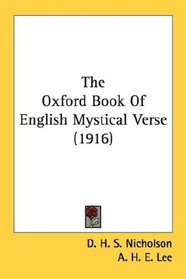Search -
The Oxford Book Of English Mystical Verse (1916)
The Oxford Book Of English Mystical Verse - 1916
The Oxford Book Of English Mystical Verse - INTRODUCTION - IN the early days of English mysticism the first translation of Dionysius Mystical Theology was so readily welcomed that it is said, in a quaintly expressive phrase, to have run across England like deere. Since that time the fortunes of mysticism in these islands have been various, but, ... more »
The Oxford Book Of English Mystical Verse - INTRODUCTION - IN the early days of English mysticism the first translation of Dionysius Mystical Theology was so readily welcomed that it is said, in a quaintly expressive phrase, to have run across England like deere. Since that time the fortunes of mysticism in these islands have been various, but, ... more »
ISBN-13: 9780548709467
ISBN-10: 0548709467
Publication Date: 11/3/2007
Pages: 664
Rating: ?
ISBN-10: 0548709467
Publication Date: 11/3/2007
Pages: 664
Rating: ?
0 stars, based on 0 rating
Publisher: Kessinger Publishing, LLC
Book Type: Paperback
Members Wishing: 2
Reviews: Amazon | Write a Review
Book Type: Paperback
Members Wishing: 2
Reviews: Amazon | Write a Review




